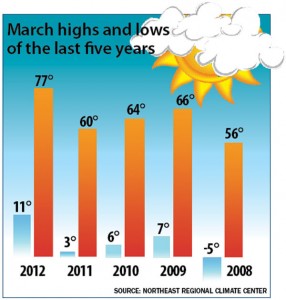The warm winter has students enthralled, but environmental experts are warning it could negatively affect everything from plants to health.

Jessica Rennells, climatologist in the Department of Earth and Atmospheric Sciences at Cornell University, said the off-season weather is expected to neutralize by the end of June and is raising questions about global warming.
“Extremes like these we experienced are something that you’d expect to see in a changing climate, but you can’t say that one strange season is a result of that,” Rennells said.
According to the Northeast Regional Climate Center, the warmest recorded temperature in Ithaca for the month of March was 85 degrees Fahrenheit in 1977. This past month had three separate days of temperatures reaching 77 degrees, and nine out of the 31 days of the month breached 70. In the past five years, the highest March temperature was 66 degrees.
Sophomore Jeremy Betterley, co-president of the Ithaca College Environmental Society, said the recent weather has left him unnerved.
“It has the appearance of climate change because it lends itself to greater variability in the weather,” he said. “Among the environmental students that I know, we’re all like, ‘Well, this weather is nice, but it sure is unsettling.’”
The unusual weather also has the spring biological ecosystem out of sync.
“Things are about three to four weeks ahead of schedule here in upstate New York,” Paul Curtis, extension wildlife specialist at Cornell, said.
Because plants are sprouting earlier this season, Jason Hamilton, associate professor of environmental studies at the college, is concerned animals — including bears, birds and bees — will not get an adequate food supply.
“One of the things that this sort of a spring makes us ecologists worried about is, ‘Are things getting out of phase?’” Hamilton said. “This particular year, it’s definitely the case.”
In many parts of New York state, including Ithaca, beekeepers are being forced to feed their bees before they starve to death because the bees are out of phase with the blooming of their main food source — nectar and pollen from flowers.
Though few enjoy Ithaca’s usually bitter winters, ecologically speaking, the cold weather normally regulates populations by killing off insects, larvae and eggs. Without the normal cold, many organisms that usually shouldn’t survive winter are increasing, Hamilton said.
“It’s too early to tell, but this is just the sort of weather that could lead to large insect outbreaks, mosquitoes, ticks, crop pests, that sort of thing,” he said.
Because of a low acorn count in the fall, Lyme disease — a tick-transmitted illness — is already a more prominent threat this year.
The local deer population, already high in the area, is expected to increase as well, Curtis said.
“It’s not only going to impact the crops,” Curtis said. “It will impact the garden plants, landscape ornamentals and the potential for deer to cause vehicle accidents and car collisions, too.”
Another concern is the lack of snowpack Ithaca had this year. Because snow acts as a water reservoir for the spring as it melts and trickles into the soil, Hamilton anticipates water shortages throughout the spring and summer.
“I don’t think it’s as dire as saying Ithaca’s going to run out of water or something, but the wildlife are potentially going to suffer,” Hamilton said. “If it turns out to not be a particularly rainy spring, we didn’t get our water resources recharged.”
The potential for the weather to become cold again before it continues to warm has Rennells concerned about the cold’s possible effect on plants that have already begun to grow.
“The average last day of freeze for Ithaca is May 15, so we’re far before May 15, and some of these vegetations that are more susceptible to cold temperatures will get frost,” she said. “Many crop-growers are worried about what will happen with this freeze.”







